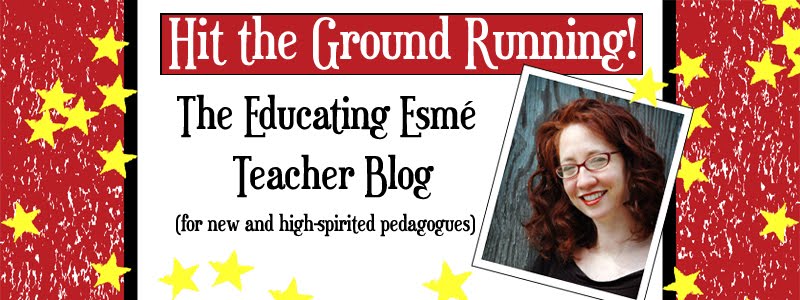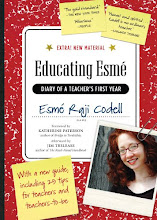I am not usually a one-issue voter.
I am not usually one to share which candidate has earned my vote. I believe in a secret ballot.
I am not usually one to “unfriend" people in cyberspace or real life based on a difference of opinion.
But.
I am voting for Bernie Sanders based on one issue: he is the only candidate who has publicly professed the need for federalized public school funding and the intention to make it a reality. And if you do not vote for Bernie Sanders even for this issue alone, I have reason to take it personally.
After seeing a documentary on PBS, Jonestown: The Life and Death of a People’s Temple and sensing some nameless and pernicious worry that might apply in my own lifetime, I gave up, happily and willingly, a successful career as an author and speaker in order to return to an equally successful career supplanting the ambitions of the nefarious through education. To that end, I am currently a Chicago Public School teacher-librarian in one of the most high-achieving and diverse working class schools in the system and possibly in the country. I love my job and work hard every day of my life, in tandem with equally hard-working teachers, staff and families to bridge the class gap through the power of the library and literacy: a great book in the hands of a “rich” child is a great book in the hands of a “poor” child. I work with others to protect vulnerable populations through critical thinking, which seems to me a basic tenant of a healthy democracy. But basic as it may seem, it’s a rare day that doesn’t go by where I don’t hear how “lucky” our school is to have a library, an arts program, a day and night custodian. It’s also a rare day that I don’t hear some deprecating remark about Chicago teachers, usually about how greedy we are for wanting pensions we paid into, or how lazy we are for not being willing to work longer hours for less pay. These are usually shrugged off; things are hard all over and the country needs scapegoats.
Every day, as a public school teacher, I know there are forces out there that are trying to break us: as stubborn proletariats who stand in the way of the corporate charter schools, as a profession predominantly composed of women who demand fair wages, as citizens who empower those that others would deport or put behind a wall. I know public school teachers are an impediment to some who have a very different set of dreams for our nation or who seek to preserve their own interests. In our country, many really do believe that poor people deserve to be poor, and that a lack of resources is the suitable punishment. Why should people in the suburbs, who have worked so hard and made the most of all their advantages, why should their children be denied…well, anything? Oligarchy feeds on the anemia of democracy, and manifest destiny is very nice for those whose destinies are so tidily manifest. The problem is, there aren’t rich and poor children, there are only rich and poor parents, and we end up punishing children for who their parents are, day by day by day. In this, we also diminish the efforts of educators.
This election is not just about creating jobs, it’s about keeping jobs. If Bernie Sanders is not elected, I will likely lose my position, sooner or later. Looking down the barrel of another Chicago Public School teacher’s strike, here’s where it stands for me: if we do not get our demands, I take a 7% pay cut. If we do, the school board will likely complain of budget shortages as a result of our demands, and it is likely resource classes will be the first to be cut. ‘Bye-bye, lucky-to-have-a-library, though I trust my embattled principal would try to save my position...as long as she can stand to work in this system herself. This, coupled with structural problems in my building, emboldened me to take an interview in a suburban district offering some job security, professional development days that aren’t furloughed, ceilings that aren’t falling on my head. I was surprised to learn the school had a thirty thousand dollar annual library book budget, as opposed to my current school’s library budget line of…uh…zero (though in fairness, my principal manages to find a few thousand, catch-as-catch-can, for which the children and I are extremely grateful). Thirty thousand, for a school two-thirds the size of my own. This should have been alluring. It was mostly troubling. Again, it is not that these children don’t deserve a school with this kind of funding. But there is a moral question of why these children deserve it, and not others? When I hear about the budgets of other schools, usually suburban schools, invariably more economically homogenous populations, it seems in direct violation of the Brown vs. Board of Education decision of 1954, and why current conditions have not been examined and litigated through this lens is beyond me. What also is beyond me is why the issue of public and equal education is not discussed as a matter of national security and why education should not at least be considered for funding through the defense budget, which is allotted the biggest piece of the pie?
That aside. Some friends, closer to retirement, encouraged me to take the position if only in the name of self-preservation. “Kids have problems everywhere,” they said. I have heard this before; the rationalization for teaching the rich. You still get to help, everyone needs help, who cares where you work so long as you can help? What this speaks to is the unwritten and perhaps the biggest teacher benefit, often used to manipulate educators in poor working conditions: that blasted intrinsic reward that comes from helping. Interestingly, the suburban school, for all of its advantages, only performed marginally better than our own on standardized tests. Would my school perform as well without a library? Research says no. For this and other reasons, I took a pass on pursuing the opportunity and was okay with the decision even though it might not make sense in the long run...depending on who gets elected.
The thing is, I did not become a teacher-librarian to solve other people’s problems, exactly; that sounds like another job, though goodness knows it is part of what all teachers do. I became a teacher-librarian to empower people, and I can do a better job of that by serving populations that are socioeconomically underserved. And I believe Bernie Sanders wants the position of president for the same reason. When people worry that Bernie Sanders won't get things done, I don't join them in their concern because I believe he has emerged to help us to get things done, not necessarily to do them for us. Even in the conversations we have as a result of his candor in the presidential race, we are the better and more thoughtful for having engaged in them. As has been paraphrased by John Steinbeck, socialism never took root in America because the poor see themselves not as an exploited proletariat but as a temporarily embarrassed millionaires. Well, attention, temporarily embarrassed millionaires. We are unnecessarily and really economically poor, and there is no place this is more evidenced than in our school systems. Just take a look at Detroit, look at Chicago. And we are the poorer when we don’t act in our own interests. I am a good teacher and I want to stay in my city school, so this election, I am going to vote for myself through Bernie Sanders. Your vote helps me stay, and your vote will help a lot of teachers stay. Good teachers who get the advocacy for which they are starved are needed for a strong economy, defense and general welfare, all federal functions. Federalizing the way schools are funded is one of the precious few ways to keep teachers who perform well in the schools that need improved performance or serve "at-risk" children, positions with the lowest retention rates among teachers and the trickiest for finding qualified hires. Bernie Sanders is the only candidate who has promised to help us implement policy to do so or even had it on his radar.
Obama, though you were eloquent in courting labor's vote when seeking your second term, you were visibly absent during the largest teacher’s strike in our nation’s history, only to parade out your charismatic wife to praise the efforts of teachers who were willing to work for no pay in a masterstroke of bad timing and bad taste (yeah, labor has a long memory). Hillary, your achievements and prowess are admirable, but your educational platform hardly inspires confidence. The continuation of overgeneralized top-down programs such as "Every Child Succeeds" and your advocacy of longer school days, the logistical problems of which makes me wonder if you have ever spoken to a teacher in your life, is indicative of your disconnection to education. Trump, Cruz and your bullying, bigoted horde, you spit on the Republican grave of Lincoln and if it weren’t for the fear of the second coming of Hitler in this ripe time of the scapegoats, you wouldn’t dignify a response at all.
Obama, though you were eloquent in courting labor's vote when seeking your second term, you were visibly absent during the largest teacher’s strike in our nation’s history, only to parade out your charismatic wife to praise the efforts of teachers who were willing to work for no pay in a masterstroke of bad timing and bad taste (yeah, labor has a long memory). Hillary, your achievements and prowess are admirable, but your educational platform hardly inspires confidence. The continuation of overgeneralized top-down programs such as "Every Child Succeeds" and your advocacy of longer school days, the logistical problems of which makes me wonder if you have ever spoken to a teacher in your life, is indicative of your disconnection to education. Trump, Cruz and your bullying, bigoted horde, you spit on the Republican grave of Lincoln and if it weren’t for the fear of the second coming of Hitler in this ripe time of the scapegoats, you wouldn’t dignify a response at all.
Problems of inequity in education spill over into all facets of our society, correlating to violence, addiction, unemployment and mental illness, conditions from which no zip code is immune. Problems of inequity in education are overdue for solving and aren't going away, and will only be exacerbated under negligent or poorly advised leadership. Teachers, readers, if education and labor issues are important to you and if you examine the issues and stances of the candidates mindfully, I think you might agree that we are fortunate to have Bernie Sanders as a candidate and to not elect him would be a missed opportunity. If you want to live in a segregationist's dream and relive our worst chapters of history, vote against him. And if you don’t know what those chapters are, all the more reason to vote for Bernie Sanders. Maybe your children will get a better education than you did.
This editorial is my own opinion and in no way is intended to represent the views of the Chicago Public School System.
This editorial is my own opinion and in no way is intended to represent the views of the Chicago Public School System.













![The Keeping Quilt [KEEPING QUILT] [Paperback]](http://ws.amazon.com/widgets/q?MarketPlace=US&ServiceVersion=20070822&ID=AsinImage&WS=1&Format=_SL160_&ASIN=B002VJYIBA&tag=planetesme)








